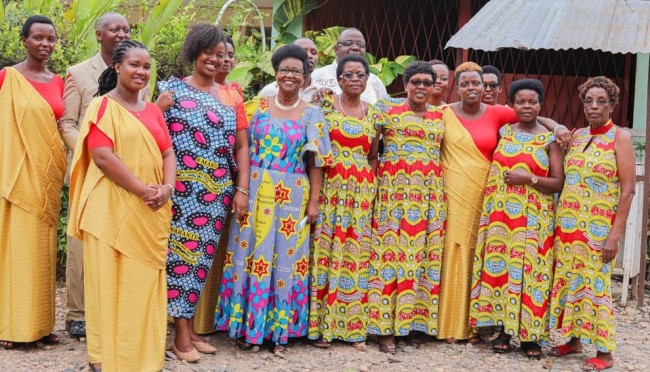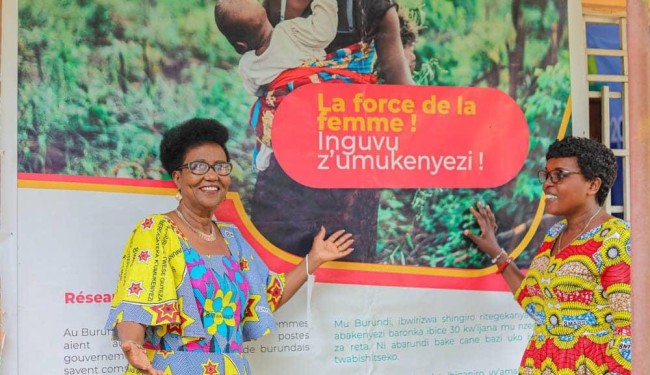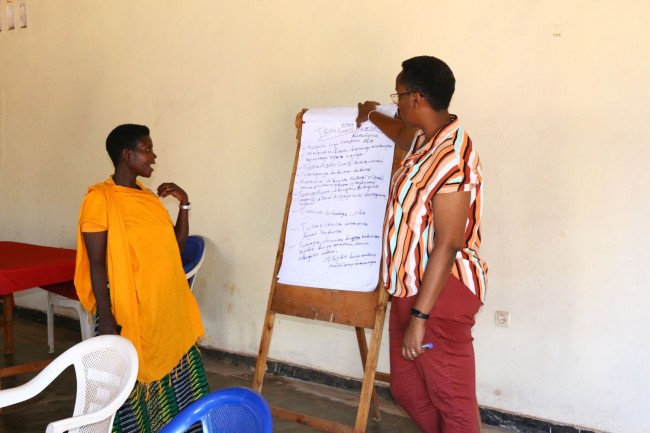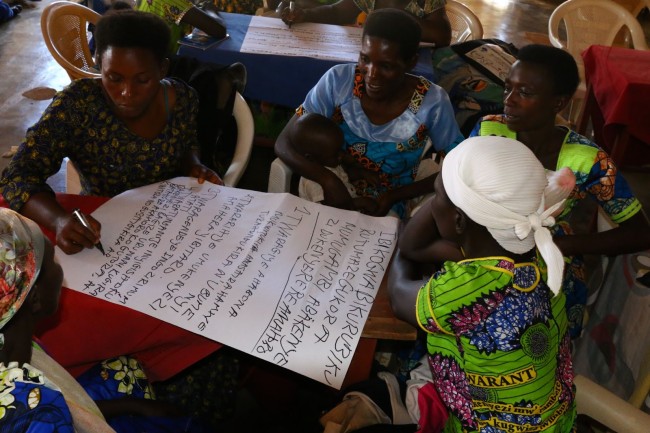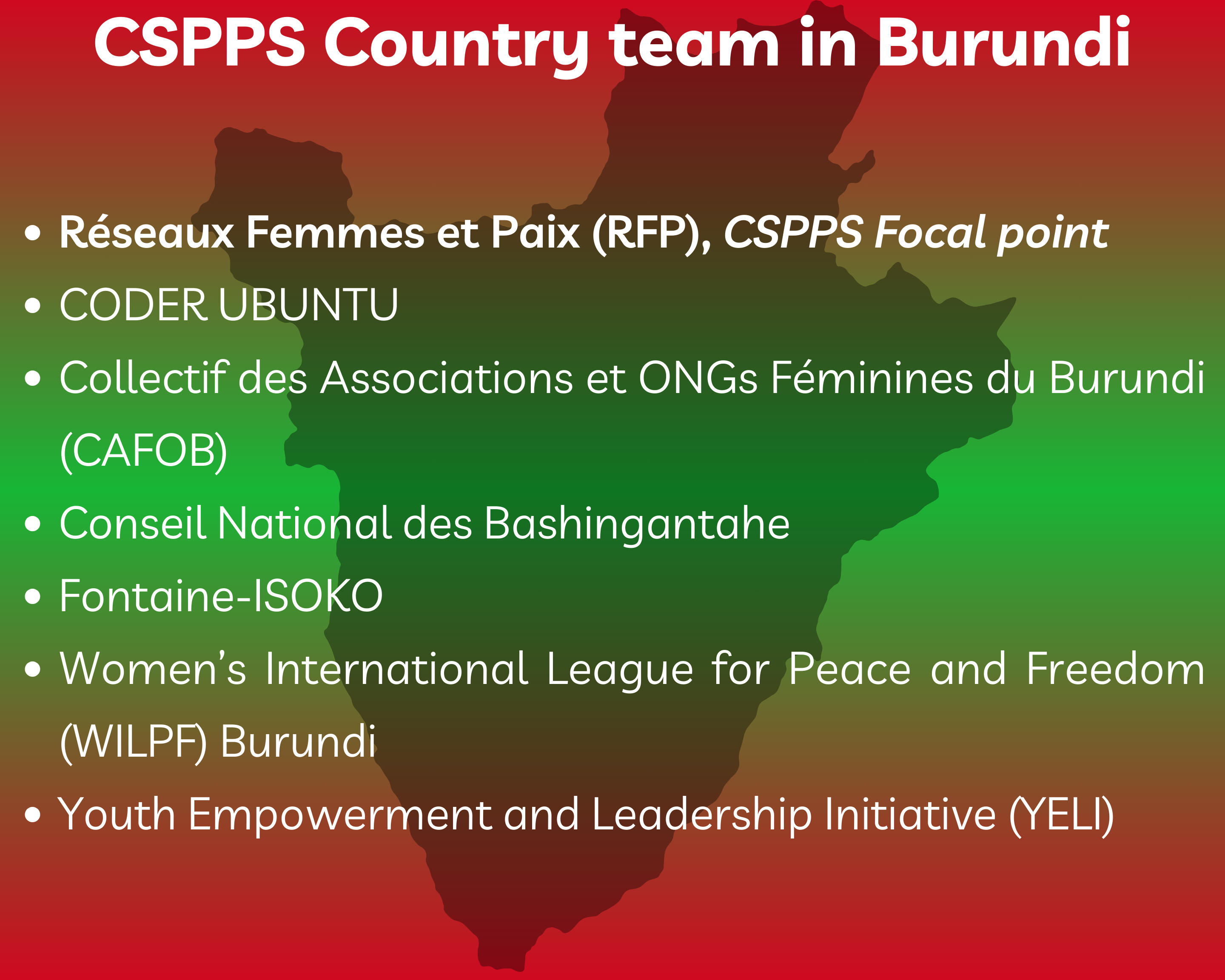
Réseau Femmes et Paix: a new impetus for gender equality in Burundi
‘Members Stories’ is a new series of articles issued by the Civil Society Platform for Peacebuilding and Statebuilding (CSPPS) in direct collaboration with its members, featuring the work of its members.
Curious to find out more about our colleagues in Burundi? This week, we contacted Pascasie Barampama and Davy Frely Nininahazwe, both residents of Burundi and involved in its development through the organisation Réseau Femmes et Paix. This article looks at the place of women in Burundian society, as well as the main activities and motivations of Réseau Femmes et Paix members in relation to gender equality and women's empowerment in Burundi.
Réseau Femmes et Paix, what commitments?
Réseau Femmes et Paix (RFP) is an organisation founded in 1999 whose primary aspirations are to work for a peaceful, rich and dynamic Burundi in which women fully enjoy their civic, political, economic and social rights. Its mission is to contribute to the development of Burundi by promoting the cause of women and their rights, increasing their effective involvement in peace-building and political decision-making processes, and strengthening their economic capacities.
The RFP team spoke to us about the situation of Burundian women, whose role in Burundian society is profoundly linked to the purely patriarchal vision that dominates the country and its customs. The phenomenon is most pronounced in rural areas, where RFP observes that men systematically embody the authority within the household, taking all the major decisions. Women, on the other hand, are reduced to the simpler, but daily and exhausting tasks of farming, animal husbandry and childcare. This ineradicable division of tasks prevents them from taking part in 1) the country's political life: Burundian women are never invited to take part in political decision-making bodies; 2) economic life: Burundian women have strictly no power or rights over the control of resources, property or inheritance; and 3) social life: Burundian women are all too often the victims of violence of all kinds.
“A peaceful, prosperous nation and region where social justice, peaceful coexistence, tolerance and equity between men and women prevail.” - Notre vision, Réseau Femmes et Paix
Faced with this situation, RFP's work over the last five years has essentially consisted of:
- Raising the awareness of Burundian women and girls for the promotion of their political, economic and social rights (awareness-raising actions, establishment of civic participation, leadership activities, links with peace and security, etc.).
- Bringing women and girls together in committed associations to build their capacities and ensure their effective involvement in Burundian society.
- Economic recovery for women through income-generating activities.
- Lobbying political decision-makers in favour of gender equality, to ensure that women's political, economic and social rights are taken into account.
- Combating gender-based violence of all kinds.
What inspired your personal commitment to defending women's rights in Burundian society?
Pascasie Barampama : “My mother, Elisabeth Mukobwa, was a peasant woman who learned to read and write in the system commonly known as “Yaga Mukama”. She raised her 14 children into proud and free men and women. Neither the disappearance of her husband, nor the violent events of 1993 that deprived her of her loved ones and possessions, took away her courage and determination to look after her family. She was a true leader, whether in the city or in the interior of the country, always directing women's groups, especially within the Catholic Church, to help them take their place in society. I chose to follow this path to honor her and the values she passed on to me, which I am proud to uphold.”
Davy Frely Nininahazwe : “As far as I'm concerned, my upbringing is the main reason. I grew up with total respect for women, whatever their status. I grew up surrounded by strong women: my grandmother, my mother who, despite the difficulties of life and the limited financial means at their disposal, didn't hesitate to take care of their children, to educate them and make them great men and women, which isn't always the case for all women in Burundi. Defending women's rights is a duty for me, and a way of paying tribute to the women who made me what I am today.”
A projet : “Bakenyezi, Dukenyerere Amahoro”, “Women, let's consolidate peace”
As part of their work, RFP was keen to share and highlight one of their projects that is particularly close to their hearts, a project entitled “Bakenyezi, Dukenyerere Amahoro” or “Women, let's consolidate peace”.
This is first and foremost a collaborative project for which RFP is working in partnership with local NGO Dushirehamwe, and the organizations Youth Empowerment and Leadership Initiative (YELI) and Concertation des Collectifs et Associations Féminines (COCAFEM), and is financially supported by the United Nations Peacebuilding Fund and Christian Aid. The project relies on networks of women's associations from all walks of life to participate meaningfully in decision-making and political spheres. More specifically, it targets the provinces of Rutana and Ruyigi, in southern Burundi, and seeks to achieve three objectives:
- Strengthening the institutional capacity of 6 networks of local women's associations, to enable them to operate and manage their associations effectively. Today, this network represents a total of 3,562 women, including both native and lifelong residents of Burundi, as well as repatriated and internally displaced women.
- Increasing the participation of women and young people in local, national and regional political dialogue and decision-making, with the aim of reinforcing institutional equality between men and women.
- The transformation of discriminatory and harmful gender norms within households, with the aim of moving towards new approaches and mentalities more oriented towards gender equality.
This partnership between RFP, Dushirehamwe, YELI and COCAFEM has already brought about a number of changes.
- A genuine network of women's associations is being set up, in some cases for the first time in certain communes.
- The funds allocated have strengthened the empowerment of women network members, especially in economic terms.
- The women elected as presidents of the communal networks are beginning to realise the potential of the networks they lead to drive political, economic and social change.
- Thanks to the BDA project, women network members have benefited from a framework for meeting political decision-makers and expressing their needs for effective participation in decision-making spheres.
- Strengthening the networks' organisational capacity has enabled them to set up solid organizations with bodies recognized by law.

